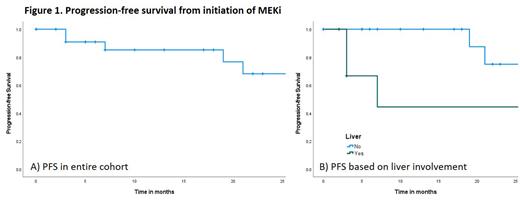Purpose: The discovery of MAPK/ERK pathway mutations has led to the approval of MEK-inhibitor (MEKi) cobimetinib in histiocytic neoplasms. However, the pivotal clinical trial that led to the approval of cobimetinib included only 4 patients with Langerhans cell histiocytosis (LCH). Therefore, there is a need to define outcomes with MEKi therapy in patients with LCH. We undertook a multi-center collaboration through the Adult LCH Working Group for the Histiocyte Society to address this gap in knowledge.
Methods: Adults with LCH who received MEKi therapy were included from five institutions. Objective response rate (ORR) was evaluated using PET/CT criteria, and CT/MRI if PET scan was not available; response categories were categorized into complete response (CR), partial response (PR), stable disease (SD), and progressive disease (PD). Progression-free (PFS) and overall survival (OS) were calculated from the time of targeted therapy initiation. Risk organ disease was defined as liver, spleen, or bone marrow involvement.
Results: 25 adults with LCH were included in this study; median age at MEKi initiation 43y (range, 18-85). Most common systems involved at diagnosis were bone (52%), pituitary (44%), and lung (36%). Risk organ involvement was observed in 7 (28%, 6 liver, 1 liver and spleen) and 2 (8%) patients had intra-axial CNS involvement. Median lines of prior therapy received were 2 (range: 1-5), and 4 (16%) patients received MEKi in first-line. MAPK/ERK pathway status was assessed via target capture next generation sequencing (NGS) in 22 (96%) cases. Amongst those who underwent NGS, alterations identified included: BRAF V600E (2/22, 9%), BRAF deletions (11/22 50%), MAP2K1 or MEK mutations (4/22, 18%), and MAPK1 or ERK2 (n=1, 5%). Overall, 5 patients also received BRAF inhibitors (4 patients as first therapy prior to MEKi and 1 concomitantly due to BRAF V600E positive melanoma). Specific MEKi agents utilized included cobimetinib (n=13) and trametinib (n=12).
Among the response evaluable patients (n=23), ORR to MEKi treatment was 78% (9 CR, 9 PR, 4 SD, 1 PD). Among the 7 patients with liver involvement, responses were seen in 2 (29%) cases. ORR did not significantly differ according to mutation status among those with NGS data (78% MAPK mutated vs. 100% unmutated; p=1.0). In this subcohort, all of the 4 cases that did not respond to MEKi had liver involvement; 3 had BRAF deletions (2 SD and 1 PD), and one had MAPK1 mutation (SD).
Median follow-up duration after MEKi initiation in the entire cohort was 18 months (95% CI 6 - 30). The median PFS and OS were not reached; 2-year PFS and OS were 78.1% and 79.9%, respectively (Figure 1A). The median PFS was much shorter in those with liver involvement (7 months [95% CI 0 - 14]) compared with those without liver disease (not reached [95% CI 19-not reached] P=0.047; Figure 1B). PFS did not differ significantly between MAPK pathway mutated and unmutated patients (p=0.34)
Adverse events (AEs) were reported in 36% (n=9) and most commonly included rash (n=5) and fatigue (n=3). Four patients experienced grade 3-4 AEs including rash, fatigue, and thrombocytopenia. Common causes of MEKi discontinuation included AEs (n=3), progression (n=2), and drug holiday (n=2). At last follow-up, 5 patients died and 18 remained on MEKi. Death was attributable to LCH (n=3), concomitant malignancy (n=1), or unknown causes (n=1).
Conclusions: In our multi-institutional study of adults with LCH, we found MEKi therapy to be highly efficacious. However, liver involvement correlated with a lack of response and worse PFS, while mutational status did not. Future studies are needed to evaluate optimum treatment for high-risk subgroups of LCH like liver disease.
OffLabel Disclosure:
Goyal:Opna Bio: Membership on an entity's Board of Directors or advisory committees. Abdel-Wahab:Nurix Therapeutics: Research Funding; Minovia Therapeutics: Research Funding; Amphista Therapeutics: Consultancy; AbbVie, Inc.: Consultancy, Membership on an entity's Board of Directors or advisory committees, Speakers Bureau; Loxo/Lilly: Consultancy; AstraZeneca: Consultancy; Harmonic Discovery: Current holder of stock options in a privately-held company. Bennani:Acrotech: Other: Advisory board; No personal compensation; Acrotech: Other: Scientific Advisory Committee, No personal compensation ; Affimed: Other: Advisory board; No personal compensation; Secura Bio: Other: Advisory board; No personal compensation; Kymera: Other: Advisory board; No personal compensation; Astellas Pharma: Other: Advisory board; No personal compensation. Lacouture:Roche: Consultancy; OnQuality: Consultancy; Lutris: Consultancy; Seattle Genetics: Consultancy; Loxo: Consultancy; Genentech: Consultancy; Trifecta: Consultancy; RBC/La Roche Posay: Consultancy; Kintara: Consultancy; Deciphera: Consultancy; Novartis: Consultancy; Janssen: Consultancy; Novocure: Consultancy; Johnson and Johnson: Consultancy, Research Funding; AstraZeneca: Research Funding; Oncoderm: Consultancy; Apricity: Consultancy. Shah:Celgene: Research Funding; MRKR Therapeutics: Research Funding; Astellas: Research Funding; AbbVie: Research Funding. Yabe:Janssen: Consultancy. Diamond:Pfizer: Other: Unpaid editorial support; Day One Biotherapeutics: Membership on an entity's Board of Directors or advisory committees; Springworks: Membership on an entity's Board of Directors or advisory committees; Opna Bio: Membership on an entity's Board of Directors or advisory committees.
Trametinib for histiocytic neoplasms


This feature is available to Subscribers Only
Sign In or Create an Account Close Modal